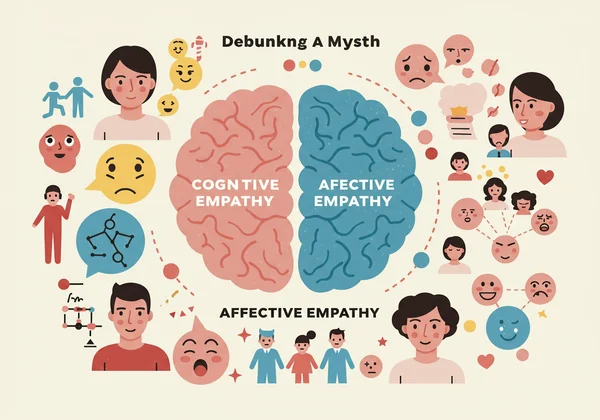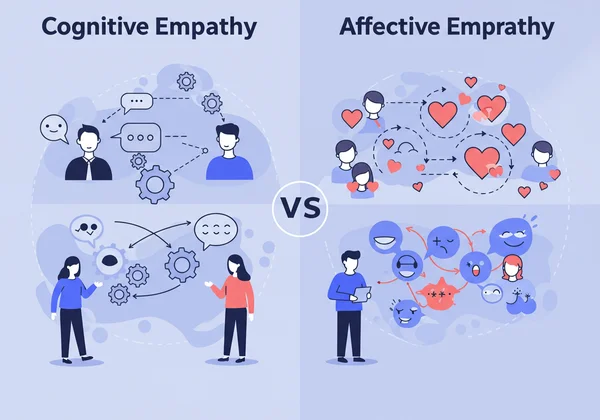Asperger's Empathy: Debunking the Myth with an Online Aspergers Test
September 15, 2025 | By Jasper Finch
One of the most persistent and damaging stereotypes surrounding Asperger's syndrome is the idea that individuals on this part of the autism spectrum lack empathy. This misconception can create significant barriers to understanding and connection. The answer to this stereotype is more complex than a simple yes or no. The core issue isn't an absence of feeling, but a difference in how emotions are processed and expressed, which is central to the aspergers empathy myth. So, let's explore the critical question: Do people with Asperger's have empathy?
This article will dismantle this harmful stereotype by exploring the different facets of empathy and how they manifest within a neurodivergent framework. We will look beyond surface-level interpretations to reveal the profound emotional landscape that often goes unseen. For those seeking to better understand themselves or a loved one, this journey is a crucial first step. If you're ready to explore your own traits, you can start your journey on our homepage.

Understanding Empathy: More Than Just One Feeling
To have a meaningful conversation about empathy, we first need to understand that it's not a single, monolithic emotion. Psychologists generally distinguish between two primary types, and exploring the difference between cognitive vs affective empathy is key to understanding the neurodivergent experience, as explained by leading mental health resources. This distinction helps clarify why a person with Asperger's might react in ways that neurotypical individuals find unexpected.

Cognitive Empathy: The Art of Perspective-Taking
Cognitive empathy is the ability to intellectually understand what another person might be thinking or feeling. It’s about putting yourself in someone else’s shoes from a logical standpoint, a skill often referred to as "Theory of Mind." This form of empathy relies on analysis, pattern recognition, and deductive reasoning to figure out another person's mental state.
Many individuals with Asperger's develop strong cognitive empathy, though it may be a learned skill rather than an intuitive one. They might use their powerful analytical abilities to observe social interactions, learn the "rules," and logically deduce an appropriate emotional response. This isn't a cold process; it's a genuine effort to connect using logic as the primary tool for perspective-taking. It's their unique way of building a bridge to another person's experience.
Affective Empathy: Feeling What Others Feel
Affective empathy, on the other hand, is the ability to feel another person’s emotions as your own. It's the visceral, gut-level reaction you get when you see someone in pain or sharing in their joy. This is the type of empathy most people think of—an immediate and shared emotional resonance.
Here, the experience for someone with Asperger's can diverge significantly. Contrary to the myth, many individuals with Asperger's don't lack affective empathy; in fact, they often experience it with overwhelming intensity. They may feel another person's distress so profoundly that it becomes their own, leading to emotional overload. This intense feeling, without the typical social filters, can be debilitating and is a far cry from the stereotype of being emotionally detached.
Unpacking the "Lack of Empathy" Myth
The misconception that people with Asperger's lack empathy often stems from a misunderstanding of their responses, not from an actual emotional deficit. The outward expression of empathy doesn't always match the internal feeling, leading to incorrect conclusions. Let's break down why this happens and explore common myths about autism.

Misinterpretation of Social Cues, Not Emotional Absence
A significant challenge for many with Asperger's is interpreting subtle, non-verbal cues. Social communication for neurotypical individuals is layered with unspoken information transmitted through facial expressions, body language, and tone of voice. An individual with Asperger's might miss these cues or take longer to process them.
For example, if a friend is upset but trying to hide it, a person with Asperger's might respond to their words ("I'm fine") rather than their pained expression. This isn't a lack of care; it's a different mode of processing information that prioritizes direct, verbal communication. Their response might appear delayed or unconventional, but the underlying concern is often very real. They might express their care by trying to solve the problem logically rather than offering traditional verbal comfort, which is an equally valid form of support.
The Paradox of Hyper-Empathy and Empathic Distress
The idea of "hyper-empathy" might seem contradictory, but it's a common experience for many on the autism spectrum. This is when affective empathy is so intense that it causes emotional overwhelm. Feeling another person's pain so deeply can be paralyzing, leading to a shutdown or withdrawal as a coping mechanism.
This state, known as empathic distress, can look like detachment or indifference from the outside. The individual might become quiet, avoid eye contact, or physically leave the situation. They aren't running away from the other person's feelings; they are trying to manage their own overwhelming internal reaction, a phenomenon documented in clinical research. This protective measure is often misinterpreted as coldness, perpetuating the myth. Recognizing this can transform our understanding of neurodiversity emotions.
Cultivating Deeper Emotional Connection in Neurodiverse Relationships
Building relationships requires understanding and adapting to different communication styles. When neurodivergent and neurotypical individuals connect, fostering a strong aspergers emotional connection is about bridging these differences with patience and clear communication. It’s about meeting in the middle.
Communication Strategies for Individuals with Asperger's
If you have Asperger's traits, learning to advocate for your needs can be empowering. One effective strategy is to verbally express what you're feeling internally, even if it feels unnatural. For example, saying "I can see you're upset, and I'm trying to understand how to help" can bridge the gap left by misinterpreted non-verbal cues.
Asking clarifying questions is also incredibly helpful. Instead of guessing, directly ask, "What do you need from me right now? Do you want advice, or just someone to listen?" This approach respects both your processing style and the other person's emotional needs. Understanding your own neurodivergent traits through tools like an online aspergers test can provide the clarity needed to develop these personal strategies.
How Loved Ones Can Foster Understanding
For partners, family, and friends, the key is to embrace direct and explicit communication. Avoid relying on hints or subtext, as they can easily get lost in translation. Be clear about your feelings and what you need, which creates a safe space for honest dialogue.
Patience is also essential. Recognize that expressions of care can be diverse. A loved one might show their empathy by researching solutions to your problem, tidying your space to reduce your stress, or simply sitting with you in silence. Value these unique demonstrations of support. If you're seeking a deeper understanding of their world, encouraging them to explore their traits can be a supportive step toward mutual comprehension.
Beyond Stereotypes: Embracing the Full Spectrum of Asperger's Empathy
The myth of the emotionless individual with Asperger's is not just inaccurate; it's an injustice to the rich inner worlds of neurodivergent people. Empathy isn't absent—it's different. It can be logical, intense, overwhelming, and expressed in ways that defy neurotypical expectations. By moving past these outdated stereotypes, we can foster a more inclusive world that values all forms of connection.
Understanding is the first step toward acceptance and self-empowerment. If this article resonates with you, and you suspect you or someone you know may have Asperger's traits, the journey to self-discovery is an empowering one. An adult aspergers test can offer invaluable clarity. We invite you to take the test now. Our anonymous, science-based test provides a personalized AI report that highlights your unique strengths and challenges, serving as a powerful step toward self-understanding.

Frequently Asked Questions About Asperger's & Empathy
Do people with Asperger's have empathy?
Yes, absolutely. However, it may be experienced and expressed differently. Many individuals with Asperger's have strong cognitive empathy (intellectually understanding others) and can experience intense affective empathy (feeling others' emotions), which can sometimes lead to emotional overwhelm. The myth of no empathy comes from misinterpreting different communication styles.
What are the symptoms of undiagnosed Asperger's in adults?
Common signs often include persistent difficulties with social communication, highly focused interests or hobbies, a strong preference for routines, and sensory sensitivities (to light, sound, or touch). Many adults seek a screening when they realize their lifelong social patterns are distinct from their peers.
How can you tell the difference between Asperger's and other conditions like social anxiety?
While they can co-occur, they are distinct. Asperger's is a neurodevelopmental profile that affects social communication, behavior, and sensory processing consistently. Social anxiety, however, is primarily characterized by an intense fear of being judged in social situations, a condition well-defined by organizations like the National Institute of Mental Health.
Can an online test provide insights into my emotional processing?
Yes, a well-designed online screening tool can be a valuable starting point. While not a formal diagnosis, a comprehensive tool like our scientific aspergers test can provide preliminary insights into your social, communicative, and emotional patterns. The detailed AI report can help you identify potential neurodivergent traits and offer a framework for better self-understanding and further exploration with a professional.